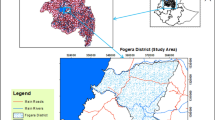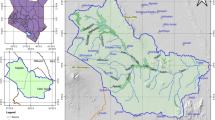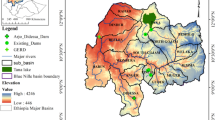Abstract
Public acceptance of treated sewage (TS) reuse in agriculture is a key element in successful implementation of TS reuse projects, but relevant research on the topic is limited. This study examined public willingness to accept (WTA) and willingness to pay (WTP) for agricultural products derived by irrigation with TS in Lorestan province, Iran, applying the contingent valuation (CV) method. The agricultural products determined for the study included corn, peaches, apricots, and plums, while TS was introduced in three qualities [Q1, complete TS treatment (i.e., physical treatment, aeration, and chemical treatment); Q2, partial TS treatment (i.e., physical treatment and aeration); and Q3, no TS treatment]. With reference to WTA, products irrigated with Q1 TS received 62.7% positive responses, while products irrigated with Q2 TS and Q3 TS received 21.3% and 17.0% positive responses, respectively. With reference to WTP, data showed that if the price of products derived by irrigation with TS was less than that of products irrigated with fresh water, some people would be willing to pay for these products (52.0% positive responses versus 48.0% negative responses). Awareness had a significantly positive impact on WTA1 and WTA2 (products irrigated with Q1 TS and Q2 TS, respectively) as well as on WTP1, WTP2, and WTP3 (products irrigated with Q1 TS, Q2 TS, and Q3 TS, respectively). Similarly, information sources had a significantly positive effect on WTP1, WTP2, and WTP3. Overall, individuals with high levels of health risk perception and high awareness showed high WTA, while non-processed corn and men were associated with low WTA. Concerning WTP, individuals with high awareness and those who had access to information sources showed high WTP, while men were associated with low WTP. Information about the importance of TS reuse, reduction of prices of products derived by irrigation with TS, and promotion of public confidence in TS are essential to increase public WTA and WTP.

Similar content being viewed by others
Data availability
The datasets used and/or analyzed during the current study are available from the corresponding author on reasonable request.
References
Abbasi H, Merianji Z, Omidinejad AR (2016) Different geographical-spatial in Khoramabad’s districts. J Environ Territ Plann 9:1–196 (in Persian)
Abdelrahman RM, Khamis SE, Rizk ZE (2020) Public attitude toward expanding the reuse of treated wastewater in the United Arab Emirates. Environ Dev Sustain 22:7887–7908
Akbari N, Shajari H, Bidram R (2017) Assessing vehicle users’ willingness to pay for price of gasoline (application of CVM). Econ Res 79:39–58 (in Persian)
Arafat W (2013) The role of public awareness towards sustainable use of treated wastewater in agricultural irrigation. MSc Thesis, Birzeit University, Birzeit, Palestine
Baghapour MA, Shooshtarian MR, Djahed B (2017) A survey of attitudes and acceptance of wastewater reuse in Iran: Shiraz city as a case study. J Water Reuse Desalin 7:511–519
Baghestani M, Zibaei M (2010) Measuring willingness of farmers to pay for groundwater in Ramjerd District: application of contingent valuation method. Agric Econ 4:1–250 (in Persian)
Bakopoulou S, Polyzos S, Kungolos A (2010) Investigation of farmers’ willingness to pay for using recycled water for irrigation in Thessaly region, Greece. Desalination 2501:329–334
Barbagallo S, Cirelli G, Indelicato S (2001) Wastewater reuse in Italy. Water Sci Technol 43:43–50
Becerra-Castro C, Lopes A, Vaz I, Silva E, Manaia C, Nunes O (2015) Wastewater reuse in irrigation: a microbiological perspective on implications in soil fertility and human and environmental health. Environ Int 75:117–135
Blumenthal UJ, Mara DD, Ayres RM, Cifuentes E, Peasey A, Stott R, Lee DL, Ruiz-Palacios G (1996) Evaluation of the WHO nematode egg guidelines for restricted and unrestricted irrigation. Water Sci Technol 22:277–283
Chamanpira R, Zand M, Veis-Karami A (2018) Analyzing the pattern of monitoring, evaluation and management of drought in Lorestan province. 3rd National Conference on Soil Conservation and Watershed Management (in Persian)
Cochran WG (1977) Sampling techniques, 3rd edn. Wiley, New York
Delli Compagni R, Gabrielli M, Polesel F, Turolla A, Trapp S, Vezzaro L, Antonelli M (2020) Risk assessment of contaminants of emerging concern in the context of wastewater reuse for irrigation: an integrated modelling approach. Chemosphere 242:125185
Deviller G, Lundy L, Fatta-Kassinos D (2020) Recommendations to derive quality standards for chemical pollutants in reclaimed water intended for reuse in agricultural irrigation. Chemosphere 240:124911
Dupont DP (2013) Water use restrictions or wastewater recycling? A Canadian willingness to pay study for reclaimed wastewater. Water Res Econ 1:61–74
Faruqui NI, Scott CA, Raschid-Sally L (2004) Confronting the realities of wastewater use in irrigated agriculture: lessons learned and recommendations. In: Scott CA, Faruqui NI, Raschid-Sally L (eds) Wastewater Use in Irrigated Agriculture. CABI Publishing, Wallingford, pp 173–186
Fatta-Kassinos D, Kalavrouziotis I, Koukoulakis P, Vasquez M (2011) The risks associated with wastewater reuse and xenobiotics in the agroecological environment. Sci Total Environ 409:3555–3563
Friedler E, Lahav O, Jizhaki H, Lahav T (2006) Study of urban population attitudes towards various wastewater reuse options: Israel as a case study. J Environ Manag 81:360–370
Gallego-Valero L, Moral-Pajares E, Román-Sánchez IM (2019) Crop production and irrigation: deciding factors of wastewater reuse in Spain? Desalin Water Treat 150:91–98
Gayarti A, Barbier E (2000) Valuing the groundwater recharge through agricultural production in the Hadejia-Nguru Westland in northern Nigeria. Agric Econ 22:247–259
Gerdes ME, Suri MR, Rosenberg Goldstein RE (2020) Traditional approaches for educating farmers about nontraditional water: evaluating preferred outreach, education, and methods for alleviating concerns. J Environ Manag 275:111265
Ghadimipour J, Dastgir M, Izadinia N (2016) Investigating the relationship between factors affecting auditors’ advocacy risk and audited adjustment opinions. Audit Know 16:77–96 (in Persian)
Gu Q, Chen Y, Pody R, Cheng R, Zheng X, Zhang Z (2015) Public perception and acceptability toward reclaimed water in Tianjin. Resour Conserv Recycl 104:291–299
Hurlimann A (2008) Community attitudes to recycled water use: an urban Australian case study – part 2. Research Report No. 56, Cooperative Research Centre for Water Quality and Treatment. Salisbury, South Australia
Hussaini ID, Aliyu B, Abubakar SI, Aminu M (2013) Assessment of health risks associated with wastewater irrigation in Yola Adamawa State, Nigeria. Int J Water Res Environ Eng 5:54–66
Inyinbor AA, Bello OS, Oluyori AP, Inyinbor HE, Fadiji AE (2019) Wastewater conservation and reuse in quality vegetable cultivation: overview, challenges and future prospects. Food Control 98:489–500
Jaramillo MF, Restrepo I (2017) Wastewater reuse in agriculture: a review about its limitations and benefits. Sustainability 9:734
Lahlou F-Z, Mackey HR, Al-Ansari T (2021) Wastewater reuse for livestock feed irrigation as a sustainable practice: a socio-environmental-economic review. J Clean Prod 294:126331
MacDonald DH, Rose JM, Lease HJ, Cox DN (2016) Recycled wastewater and product choice: does it make a difference if and when you taste it? Food Qual Prefer 48:283–292
Mahjoub O, Jemai A, Gharbi N, Arbi AM, Dekhil S (2018) Public acceptance of wastewater use in agriculture: Tunisian experience. In: Hettiarachchi H, Ardakanian R (eds) Safe use of wastewater in agriculture: from concept to implementation. Springer Publishing, New York, pp 131–157
Massoud MA, Kazarian A, Alameddine I, Al-Hindi M (2018) Factors influencing the reuse of reclaimed water as a management option to augment water supplies. Environ Monit Assess 190:531
McKay J, Hurlimann AC (2003) Attitudes to reclaimed water for domestic use: part 1 age. Water J Aust Water Assoc 30:45–49
Mendoza-Espinosa LG, Burgess JE, Daesslé L, Villada-Canela M (2019) Reclaimed water for the irrigation of vineyards: Mexico and South Africa as case studies. Sustain Cities Soc 51:101769
Menegaki AN, Hanley N, Tsagarakis KP (2007) The social acceptability and valuation of recycled water in Crete: a study of consumers’ and farmers’ attitudes. Ecol Econ 621:7–18
Michetti M, Raggi M, Guerra E, Viaggi D (2019) Interpreting farmers’ perceptions of risks and benefits concerning waste water reuse for irrigation: a case study in Emilia-Romagna (Italy). Water (Switzerland) 11:108
Mirzashahi K, Bazargan K, Baghori A (2015) Wastewater and its use in agriculture. Agricultural Research, Education, and Extension Organization, Institute of Soil and Water Research, Technical Bulletin No. 534 (in Persian)
Mok H-F, Hamilton AJ (2014) Exposure factors for wastewater-irrigated Asian vegetables and a probabilistic rotavirus disease burden model for their consumption. Risk Anal 34:602–613
Mu'azu ND, Abubakar IR, Blaisi NI (2020) Public acceptability of treated wastewater reuse in Saudi Arabia: implications for water management policy. Sci Total Environ 721:137659
Oron G (2003) Agriculture, water and the environment: future challenges. Water Sci Technol 3:51–57
Pazira M, Bagheri HR (2007) Health risks from the reuse of wastewater in agriculture. Proceedings of 6th Conference of Agricultural Economics (in Persian)
Petousi I, Daskalakis G, Fountoulakis MS, Lydakis D, Fletcher L, Stentiford EI, Manios T (2019) Effects of treated wastewater irrigation on the establishment of young grapevines. Sci Total Environ 658:485–492
Qadir M, Wichelns D, Raschid-Sally L, McCornick PG, Drechsel P, Bahri A, Minhas PS (2010) The challenges of wastewater irrigation in developing countries. Agric Water Manag 97:561–568
Ravishankar C, Nautiyal S, Seshaiah M (2018) Social acceptance for reclaimed water use: a case study in Bengaluru. Recycling 3:4
Rezaei-Banafsheh M, Kakolvand M (2015) Zoning Lorestan Province by using cluster analysis. J Phys Geogr 7:41–50 (in Persian)
Rice J, Wutich A, White DD, Westerhoff P (2016) Comparing actual de facto wastewater reuse and its public acceptability: a three city case study. Sustain Cities Soc 27:467–474
Robinson K, Robinson C, Hawkins S (2005) Assessment of public perception regarding wastewater reuse. Water Sci Technol 5:59–66
Saliba R, Callieris R, D’Agostino D, Roma R, Scardigno A (2018) Stakeholders’ attitude towards the reuse of treated wastewater for irrigation in Mediterranean agriculture. Agric Water Manag 204:60–68
Saxena R, Frost S (1992) Sewage management in some Asian countries. Environ Manag Health 3:18–26
Statistical Center of Iran (2016) Iran Statistical Yearbook. March 23, 2016
Stotts R, Rice J, Wutich A, Brewis A, White D, Maupin J (2019) Cross-cultural knowledge and acceptance of wastewater reclamation and reuse processes across select sites. Hum Organ 78:311–324
Tsagarakis KP, Georgantzis N (2003) The role of information on farmers’ willingness to use recycled water for irrigation. Water Sci Technol 3:105–113
Tsagarakis KP, Tsoumanis P, Charzoulakis K, Angelakis AN (2001) Water resources status including wastewater treatment and reuse in Greece: related problems and prospectives. Water Int 26:252–258
Tzortzakis N, Saridakis C, Chrysargyris A (2020) Treated wastewater and fertigation applied for greenhouse tomato cultivation grown in municipal solid waste compost and soil mixtures. Sustainability (Switzerland) 12:4287
Venkatachalam L (2004) The contingent valuation method: a review. Environ Impact Assess Rev 24:89–124
Wester J, Timpano KR, Çek D, Lieberman D, Fieldstone SC, Broad K (2015) Psychological and social factors associated with wastewater reuse emotional discomfort. J Environ Psychol 42:1623
Zarghani SH, Mohammadzadeh M, Nadi M, Varzdar M (2013) Investigation of water challenges in South Khorasan Province and its role in security. National Congress of South Khorasan ‘Social Order and Security’, pp. 69–83 (in Persian)
Zhang W, Li Y, Wang C, Wang P, Wang Q, Wang D (2017) How could wastewater reuse in China meet the national ambitious water management strategy? Desalin Water Treat 76:319–327
Zhu Z, Wang H, Li A (2019) On the factors influencing public knowledge and acceptance of reclaimed water from a survey of three cities in northern China. J Water Reuse Desalin 9:193–202
Author information
Authors and Affiliations
Contributions
ZD collected the field data, conducted statistical analysis of the data, and wrote the first draft in Persian language; AB conceptualized the study, supervised the methodology, validated the data, and wrote the original draft in English language; CAD validated the data, reviewed and edited the text, and prepared the final draft; ZF conducted statistical analysis of the data.
Corresponding authors
Ethics declarations
Ethics approval and consent to participate
This is an observational study. Ethics committee approval before study start was not mandatory.
Consent for publication
Not applicable.
Competing interests
The authors declare no competing interests.
Additional information
Responsible editor: Ta Yeong Wu
Publisher’s note
Springer Nature remains neutral with regard to jurisdictional claims in published maps and institutional affiliations.
Rights and permissions
About this article
Cite this article
Deh-Haghi, Z., Bagheri, A., Damalas, C.A. et al. Horticultural products irrigated with treated sewage: are they acceptable?. Environ Sci Pollut Res 28, 54057–54068 (2021). https://doi.org/10.1007/s11356-021-14552-8
Received:
Accepted:
Published:
Issue Date:
DOI: https://doi.org/10.1007/s11356-021-14552-8




